|
|
|
Sort Order |
|
|
|
Items / Page
|
|
|
|
|
|
|
| Srl | Item |
| 1 |
ID:
190094
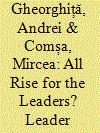

|
|
|
|
|
| Summary/Abstract |
This article explores the extent to which the observable characteristics of political leaders influence the magnitude of electoral personalisation in the new democracies of Central and Eastern Europe. Using CSES data, it analyses 18 legislative elections spanning 16 years of postcommunism, providing strong evidence that personalisation is relevant and widespread in the region and arguing that the electoral context is relevant for how leader characteristics affect personalisation. Some characteristics stimulate leader effects (age, executive experience, tenure as party chair), while others confine them (being an anti-communist dissident), have ambiguous (being a former communist leader) or no effects (gender, incumbency, time in office).
|
|
|
|
|
|
|
|
|
|
|
|
|
|
|
|
| 2 |
ID:
092996
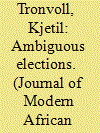

|
|
|
|
|
| Publication |
2009.
|
| Summary/Abstract |
The 'non-electoral context' of elections is often overlooked in democratisation studies, in order not to obscure an otherwise clear model or theory of transition. A key challenge for research on democratisation processes is to balance electoral 'formalities' with contextual factors, qualitative perceptions and non-electoral issues, in order to reach a more nuanced and comprehensive understanding of democratic transitions. This article advocates a multilayered approach to - or a 'thick description' of - elections, as this will capture the diversity of real life experiences and expose alternative power discourses competing with the electoralist one in influencing the path of democratisation. In so doing, it casts light on the crucial impact of the Eritrean-Ethiopian war on Ethiopia's 2005 election, in addition to other qualitative and contextual factors, which lead to the conclusion that the advancement of democracy through multiparty elections in Ethiopia under the Ethiopian Peoples' Revolutionary Democratic Front (EPRDF) has failed.
|
|
|
|
|
|
|
|
|
|
|
|
|
|
|
|
| 3 |
ID:
171856
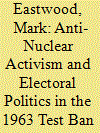

|
|
|
|
|
| Summary/Abstract |
In the summer of 1961, President John F. Kennedy was sailing his yacht, the Honey Fitz, in the waters off Hyannis Port. His guests on-board that day included Adlai Stevenson and Harlan Cleveland, both of whom were there to discuss the United States’ position on disarmament ahead of the reopening of the United Nations General Assembly. On the campaign trail the previous year, then-Senator Kennedy had repeatedly championed a new, more earnest approach to disarmament. Kennedy attacked President Eisenhower for his “lack of a concrete plan for disarmament,” while telling the annual conference of the National Committee for a Sane Nuclear Policy (SANE) that arms control would be “an obligation of the highest priority in the next administration.”
|
|
|
|
|
|
|
|
|
|
|
|
|
|
|
|
| 4 |
ID:
109147
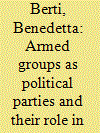

|
|
|
|
|
| Publication |
2011.
|
| Summary/Abstract |
In recent decades, armed groups have shown an increased interest in creating political parties to take part in institutional politics. By using these political wings to participate in elections and win public office, some of them have gained enormous political power. However, despite the important real-world implications of this trend, the existing literature on the topic is still underdeveloped. This article contributes to a better understanding of this subject by examining the factors that motivate armed groups to set up a political wing and compete in elections and by assessing how political participation affects an armed group's strategic outlook. The hypotheses on political wing formation and development are tested by analyzing the decision-making patterns of Hizballah. The findings suggest that the political involvement of armed groups does not follow a linear development process from armed to political organization, but instead assumes cyclical patterns: political accommodation and armed struggle are chosen in turn in response to shifts in the relation and the internal balance of power between a given group's political and armed wings.
|
|
|
|
|
|
|
|
|
|
|
|
|
|
|
|
| 5 |
ID:
107158


|
|
|
|
|
| Publication |
2011.
|
| Summary/Abstract |
In 2004, an al Qaeda affiliate killed 191 civilians in Madrid. Spain's general election three days later confounded pollsters' expectations; the incumbent Partido Popular was ousted by the challenging Partido Socialista Obrero Español ( psoe ), a party committed to withdrawal from Iraq. This manuscript examines the notion that this was a strategic terrorist success. The first strategic form considered is coercive bargaining. The paper finds that al Qaeda is not a credible coercive agent and debunks the popular myth that Spanish voters entered a coercive bargain with the network. The paper also considers the attacks through the strategic frameworks of terrorist advertising, provocation, regime destabilization, and morale building. It finds that the attacks' only strategic achievement was building morale. Finally, the paper provides a multi-factor explanation of how the Madrid bombings contributed to the psoe victory despite their lack of strategic impact. The upshot of the analysis is that there is little reason to believe such electoral impact is replicable.
|
|
|
|
|
|
|
|
|
|
|
|
|
|
|
|
| 6 |
ID:
117119
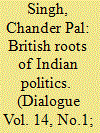

|
|
|
| 7 |
ID:
132312
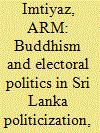

|
|
|
|
|
| Publication |
2014.
|
| Summary/Abstract |
Organized religions often play a significant role in the political affairs of any country when political actors carefully employ them to pursue power. Buddhism is the major religion on the island of Sri Lanka, and often it becomes a powerful symbol for Sinhala-Buddhist politicians. This study examines the interaction between Buddhism and politics in Sri Lanka, and will attempt to examine the religious factors in Sri Lanka's ethnic conflict between the two nations; namely, Tamil and Sinhala. It will examine how the politicization of Buddhism helped Sinhala political elites and leaders in their quest for power, reinforcing religious and ethnic tensions, and finally will discuss some solutions to de-religionize the state structure to help Sri Lanka enjoy the fruits of modernization and democracy.
|
|
|
|
|
|
|
|
|
|
|
|
|
|
|
|
| 8 |
ID:
120056
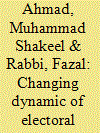

|
|
|
| 9 |
ID:
159695
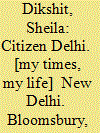

|
|
|
|
|
| Publication |
New Delhi, Bloomsbury, 2018.
|
| Description |
ix, 175p.hbk
|
| Standard Number |
9789386826473
|
|
|
|
|
|
|
|
|
|
|
|
Copies: C:1/I:0,R:0,Q:0
Circulation
| Accession# | Call# | Current Location | Status | Policy | Location |
| 059408 | 923.2/DIK 059408 | Main | On Shelf | General | |
|
|
|
|
| 10 |
ID:
131275


|
|
|
| 11 |
ID:
145957
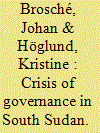

|
|
|
|
|
| Summary/Abstract |
Since mid-December 2013, thousands of people have been killed in armed conflict in South Sudan. The fighting is entrenched in a power struggle between the main political contenders ahead of elections which were scheduled for 2015. This article examines the violence in South Sudan since the North–South war ended with a focus on the consequences of the introduction of electoral politics. Our research contributes to the literature on state-building and peace-building in war-torn societies, by exploring how the extreme levels of violence are linked to three groups of factors. First, the stakes involved in being part of the government are extremely high, since it is the only way to secure political and economic influence. Second, the actors involved in political life are dominated by individuals who held positions within the rebel groups, which increases the risk of political differences turning violent. Third, the institutions important for a legitimate electoral process, and which work to prevent violence, are weak or non-existent.
|
|
|
|
|
|
|
|
|
|
|
|
|
|
|
|
| 12 |
ID:
185525
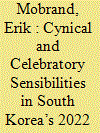

|
|
|
|
|
| Summary/Abstract |
Why was South Korea’s 2022 presidential election so close, when only a few years prior the party of the winning candidate had been out of contention? The answer can be found by situating the election against a battle between democratic and anti-democratic forces. Anti-democratic forces cynically bid for power by denigrating politics. An examination of how this cynical sensibility developed, from 2016 to 2022, but on the back of a deeper history, points both to what was at stake in this election and to the methods deployed by representatives of the anti-democratic forces that helped create parity in the vote.
|
|
|
|
|
|
|
|
|
|
|
|
|
|
|
|
| 13 |
ID:
092609
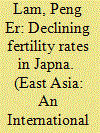

|
|
|
|
|
| Publication |
2009.
|
| Summary/Abstract |
The two key impediments to addressing the ageing crisis of Japan are: electoral politics which avoid making hard decisions painful to voters (especially the hiking of the consumption tax), and even more insidious, the norms of Japanese corporations and patriarchal society which discourage women from marrying and producing babies while holding onto a career and aspirations of their own. If Japan's ageing problem were to persist in the long run, then a concomitant decline in its manufacturing capacity (which underpins its export-dependent economy) and a diminution of its political weight in its international affairs can be anticipated.
|
|
|
|
|
|
|
|
|
|
|
|
|
|
|
|
| 14 |
ID:
131613
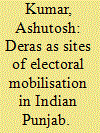

|
|
|
|
|
| Publication |
2014.
|
| Summary/Abstract |
Mushrooming of the deras in Indian Punjab, and the role of some of these deras in influencing the political choices of their followers, most of whom belong to the socially and economically marginal groups, is being recognised and apparently encouraged by the political parties. This is evident in the fact that political leaders/candidates cutting across party divides flocked to various deras in the run-up to the recent elections. This phenomenon can be attributed primarily to the fact that the social basis of political power of state has remained unaltered in favour of the upper castes/communities. Unwilling to share power, yet compelled to seek the crucial support of numerically strong and economically mobile dalit and other backward castes voters in a closely contested bi-polar polity, the upper-caste political leadership takes recourse to the 'softer' option of cultivating the deras to 'deliver' en bloc the marginal-castes votes. With one form of the identity politics based on ethno-regional communal divide having receded to background, it is the turn of the caste-based identity politics through the 'dera route' that is prevailing in post-militancy Punjab.
|
|
|
|
|
|
|
|
|
|
|
|
|
|
|
|
| 15 |
ID:
177618
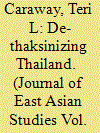

|
|
|
|
|
| Summary/Abstract |
Almost two decades after the initial victory of Thai Rak Thai, scholars still debate the forces behind Thaksin's rise to power. I revisit these debates and argue for a more explicit analysis of dynamics over time. I distinguish analytically between the founding moment of TRT's first victory and the subsequent reproduction of its dominance. I argue that TRT's financial muscle was a sufficient condition for its 2001 victory, that institutions merely contributed to the scale of its victory, and that its platform was not decisive. Once in power, however, institutions were instrumental in allowing TRT to complete its term, but more important for its long-term dominance was the rapid implementation of its campaign promises, which created a mass constituency that in turn made Thaksin-linked parties resilient at the polls despite institutional reforms designed to weaken their electoral performance.
|
|
|
|
|
|
|
|
|
|
|
|
|
|
|
|
| 16 |
ID:
091727
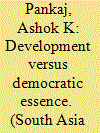

|
|
|
|
|
| Publication |
2009.
|
| Summary/Abstract |
This article reflects on the role of voters' preference for democratic essence over development-related issues in the 2005 Haryana and Bihar Assembly elections. Based on analysis of these elections, it is argued that in a society where the distributive effects of development are less than egalitarian, economic deprivations are reinforced by socio-political inequality, but democracy still promises to be a great equaliser and source of empowerment for the masses. Democratic issues therefore appear to have greater electoral and political appeal than promises of 'development' or small morsels of favour to entice an electorate. This finding indicates an increasingly sophisticated understanding of the Indian electorate about the critical relevance of democracy.
|
|
|
|
|
|
|
|
|
|
|
|
|
|
|
|
| 17 |
ID:
122785
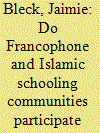

|
|
|
|
|
| Publication |
2013.
|
| Summary/Abstract |
Despite strong empirical evidence of the influence of religious brokers on political mobilisation in Africa, we know very little about the individual-level relationship between religious association and political behaviour. Drawing upon an emerging comparative literature on the effect of social service provision on political participation, this article asks whether Malian consumers of Islamic schooling are as likely to seize new democratic opportunities for electoral participation as their peers who send their children to public schools. Using an original survey of 1,000 citizens, exit polling and interviews, this analysis demonstrates that parents who enrol their children in madrasas are less likely than other respondents to report voting. Conversely, parents who send their children to public schools are more likely to participate in electoral politics.
|
|
|
|
|
|
|
|
|
|
|
|
|
|
|
|
| 18 |
ID:
142483
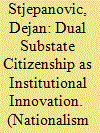

|
|
|
|
|
| Summary/Abstract |
This article analyzes the politics and constitutional position of the Brčko District of BiH, drawing on this case to inform several important debates in the field with regards to questions of federalism, citizenship, and electoral politics. The article shows that the condominium logic of territorial arrangement has profound implications for substate citizenship in Brčko. It argues that apart from territorial options and consociational institutional mechanisms substate citizenship is an important element of conflict management. Though often neglected in the literature, dual substate citizenship could be considered an instrument of conflict management and, as this article argues, as a model of institutional innovation in divided societies.
|
|
|
|
|
|
|
|
|
|
|
|
|
|
|
|
| 19 |
ID:
151139
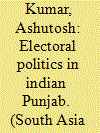

|
|
|
|
|
| Summary/Abstract |
The forthcoming Assembly elections in Punjab in early
2017 indicate signs of a new phase in the electoral history of this
state, largely dominated earlier by various political alliances headed
by the Shiromani Akali Dal (SAD) under Jat Sikh leadership.
Presented within the wider Indian electoral landscape, this article
offers an analytical overview of Punjab’s electoral politics as it has
evolved since partition from the vantage point of SAD. It is argued
that there are several good reasons why traditional SAD domination
and style of leadership are presently being challenged through a
combination of new political actors and, significantly, changing
awareness among a very diverse electorate about what to expect
from any government one elects.
|
|
|
|
|
|
|
|
|
|
|
|
|
|
|
|
| 20 |
ID:
173872
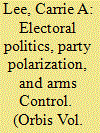

|
|
|
|
|
|
|
|